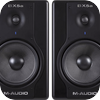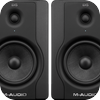I am currently looking at studio monitors because I am just going to start recording. I don't have a very large budget, but at the same time, I want quality sound. I listened to a pair of m-audio bx5a's and thought they sounded good for the price. I was looking into them on GC's website and found the m-audio bx5 d2's. So was wondering what the difference is between the m-audio bx5a and the bx5 d2? I appreciate any input.
ps. if there are nicer monitors for around the same price, I am open to other options.
Comments
When I first started recording music I bought a pair of bx5's.
When I first started recording music I bought a pair of bx5's. I used them for about two years when I started hearing some other monitors and the difference. The m-audio's are ok, but I felt like there was a blanket draped over the front of them, just never could hear clarity in any of the frequencies.
ps. if there are nicer monitors for around the same price, I am open to other options.
I would take a set of Behringer monitors (3030a, or 3031a probably) over the m-audio's. And for a little bit more money, Event makes great monitors at a very affordable price! The KRK v6, and v8 monitors were always good sounding as well. You could pick a pair of them up on ebay pretty cheap. they are no longer made.
hope that helps a little
I would take a set of Behringer monitors (3030a, or 3031a probab
I would take a set of Behringer monitors (3030a, or 3031a probably) over the m-audio's.
Pesronally, I wouldn't take Behringer ANYTHING over anything else, at this point. Most especially, any used stuff. They have a ton of work to do to repair their well-deserved reputation for extremely poor quality and cheezoid tactics. "HEY...those tubes are really a'glowin' in that Tube UltraGain!" (Yep...from yellow-orange LEDs behind them!)
Don't believe me? Just Google "Behringer repair", "Behringer problems" or something similar, and prepare for page after page after page after page.....
At LEAST Google the model and "repair" or "problems", before jumping into buying. Then again, those particular monitors may be relatively trouble-free. It's good to research anything before purchasing, but it's especially critical to research some companies' products, and, unfortunately...they are one of those companies.
They definitely know about their reputation. Hopefully, they WILL eventually get their act together, but they'll have to prove it over time. As long as nobody complains, though, why change?
But, then...more and more Chinese-made garbage that's flooding our shores are cheap and disposable, so they are not alone in prolonging this mess...and sending U.S. dollars to fund the Chinese military through their near-slave labor, human-rights violations and allowing them to create magnitudes more environmental damage than what we can more-responsibly do here in manufacturing...while we're cutting jobs...and everything else.
Sorry. Just getting tired of seeing "Made in China" on nearly everything, 99% of it being cheap inferior junk that just breaks down, drains our dollars, and creates more costs in landfill waste, recycling and repurchasing another item to replace it. Things USED to last (quality American-made stuff). My mother still has a 1949 GE refrigerator that works perfectly, and the only thing that has ever been done to it was a belt replacement about 30 years ago. (Of course, it's not exactly the most efficient fridge, but it makes a good garage beer and pop fridge).
I have a 1949 Kalamazoo amp that still works perfectly, and all that's been changed is the AC cord and 3 capacitors.
Is there ANYTHING made these days that will last 65 years, and still be usable? I guess when we DEMAND "cheap"...that's what we get. And, that's one of the reasons we are sinking.
Kapt.Krunch
Even the most expensive monitors will only sound as good as the
Even the most expensive monitors will only sound as good as the environment in which they are used.
Now, you can improve certain things a little bit, like placing yourself as close to the monitors as possible to help alleviate reflections from surfaces, - the theory here is that the closer you are to the speakers, the more of the direct sound from the speakers your ears will hear first - as opposed to hearing the reflections of sound bouncing off different elements in the room. Also, mixing in a position as close to the center of the room as possible can also help... try to avoid shoving yourself up against a wall or in a corner...
I've never used M-audio monitors so I can't comment on whether they are good reference nearfields or not...
But.... if your room is lying to you - and low end is almost always the culprit in "bedroom" studios ("bedroom" in this case being a generic term that also includes basements, garages, attics... any area that wasn't designed for acoustic accuracy and is just another space where you decide to work) then you could have a pair of some of the nicest high dollar monitors available, and you'd still have problems if your listening environment is inferior.
Put it this way... if given a choice? I'd rather mix through the cheapest monitors available in a highly tuned room, than mix through high dollar boutique monitors in a room that had problems and sounded bad.
FWIW
-d.





Invest in control room acoustics first. Learn about that area of
Invest in control room acoustics first. Learn about that area of recording first ( maybe you already have?) and you will thank me forever! Get that right before you look for monitors. Then, once your room is treated, go to your local music store and ask them if you can take a few pairs home to try. Choose the ones you feel sound most beneficial in your room, not the store or from another mans opinion this early in your game.
Monitors are like shoes or even better, prescription glasses. There is no one right pair. But, you still do ask a good question. I hope this makes sense.
Examples:
Bright monitors can "strategically" help produce bassier mix's. Dull monitors can "strategically" help produce brighter music. Bright monitors may "strategically" be better for older people with hearing loss. Acoustically treated rooms help you hear whats coming out of the monitors, in your particular room more accurately.
Monitors are like eye glasses. They are designed to help you hear up close or farther away and also for short or long durations. You choose the monitors for you and design your room for music. CONTROL ROOM acoustic are a lot more serious than you can imagine.